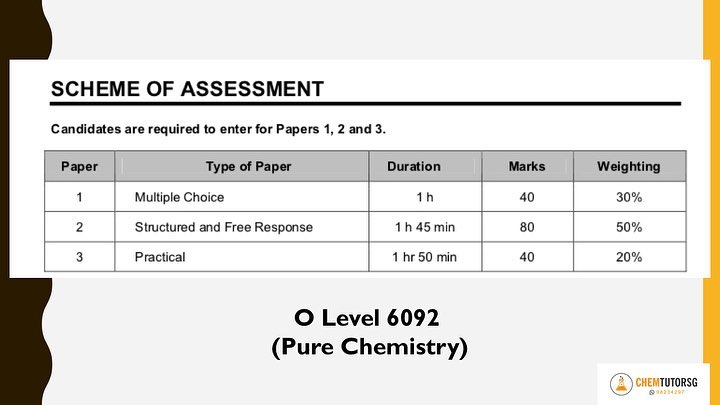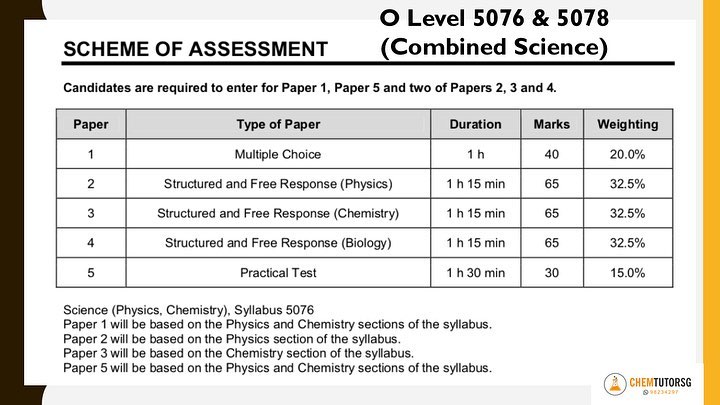|
Recently, I got a call from a desperate mother who found my number through this website. Her daughter has not been doing well for Pure Chemistry and the school has advised her to drop to combined Science (chemistry/biology). "What should I advise my child?" she asked me. In order to give a good advice, there are multiple factors to consider. 1. How different are the syllabuses? The syllabus content of combined Chemistry is approximately 75% of the whole Pure Chemistry syllabus. Obviously, your child will need to study less content. What exactly is the difference? The whole topic on the most hated ELECTROLYSIS will be removed! Yay! Other significant portions removed are:
2. How different are the exam requirements? Differences based on the scheme of assessment:
Scheme of Assessment taken from SEAB Website 3. Will dropping to combine science affect entry to JC/Poly? Yes, it will. By dropping to combine Science, the subject combination for JC entry will be more limited. (Do check the entry and subject combination requirements from the respective official school websites.) However, some students are very sure of the path that they are going to take once they complete their secondary school education. Thus, they may choose to pursue their interest in theater studies, humanities etc. So, it's important to discuss your child’s strengths as a family and decide base on your child's ambitions and interests and not choose base on what others will do! 4. My thoughts? Combined Science is so much easier to score. It's quite common for students who dropped to combine Science to score better as these students have more in depth knowledge compared to their peers who have only studied the combine Chemistry syllabus before. Many tutors may think that by dropping from two subjects to one subject, your child will be taking a huge risk as there's only one science subject for the L1R5 calculation. But in my opinion, it's much easier to score an A1 or A2 for combine Chemistry compared to scoring an A1 or A2 or even B3 for pure Chemistry. I'm confident to say that as all my combine Chemistry students score 100% distinctions despite coming from different backgrounds. Some met me after dropping from Pure Chemistry and others have taken combine Chemistry from the start. 5. When should I DISCOURAGE my child to drop to combine Science? There are some students who are doing poorly for both Sciences. In this case, it is wisest to drop to combine Science for sure. However, if your child is doing very well and scoring distinctions for one of the Pure Sciences, I will suggest not to waste that effort already put in and continue to take up 2 Pure Sciences. Encourage your child to put in more time and effort for the weaker Science using whatever that worked for the stronger Science. It is essential to find a good tutor in order for your child to clarify doubts once and for all. If your child can be good at one Science, he will most likely have the skills and aptitude to score well in the other. Sometimes, it also depends on the difficulty of the papers set. In certain schools, the papers are set to 'kill' while in others, the papers are so much easier compared to the O level standard. In this case, you will need an experience tutor to analyse the paper to know the 'actual' standard of your child. Do not base just on the percentage written on the paper itself. It may or may not be an accurate representation. 6. What did you advise that particular student? During my first session with the student, I looked through her Secondary 3 to 4 tests and exam papers. I also analysed her Secondary 4 Pure Chemistry mid-year papers which she just received back. I advised her to drop to combine Science. Why?
She is currently having intensive lessons with me and we are making fast progress. Our aim? A1 for combine Science. Nothing less than that. I hope I have given you a balanced viewpoint based on my own experiences and opinions. In short, there's no right or wrong way to decide whether to drop to combine Science. It all depends...
Contact me if your child needs someone for advice. Comments are closed.
|
Mrs Lim
A Chem-Addict passionate about teaching and learning Chemistry. Archives
February 2023
Categories |
- Home
- More Information
- Contact Me
- Blog
-
FREE 5-MIN Notes
- 1. Experimental Techniques
- 2. Methods of Purification
- 3. Separation Techniques
- 4. Qualitative Analysis
- 5. Kinetic Particle Theory
- 6. Atomic Structure
- 7. Elements, Compounds, Mixtures
- 8. Ionic Bonding
- 9. Covalent Bonding
- 10. Mole Concept
- 11. Electrolysis
- 12. Energy Changes
- 13. Speed of Reaction
- 14. Redox
- 15. Acids and Bases
- 16. Salts
- 17. Ammonia
- 18. Periodic Table
- 19. Metals
- 20. Air
- 21. Fuels
- 22. Organic Chemistry
- 23. Macromolecules
- Free Printables





 RSS Feed
RSS Feed
